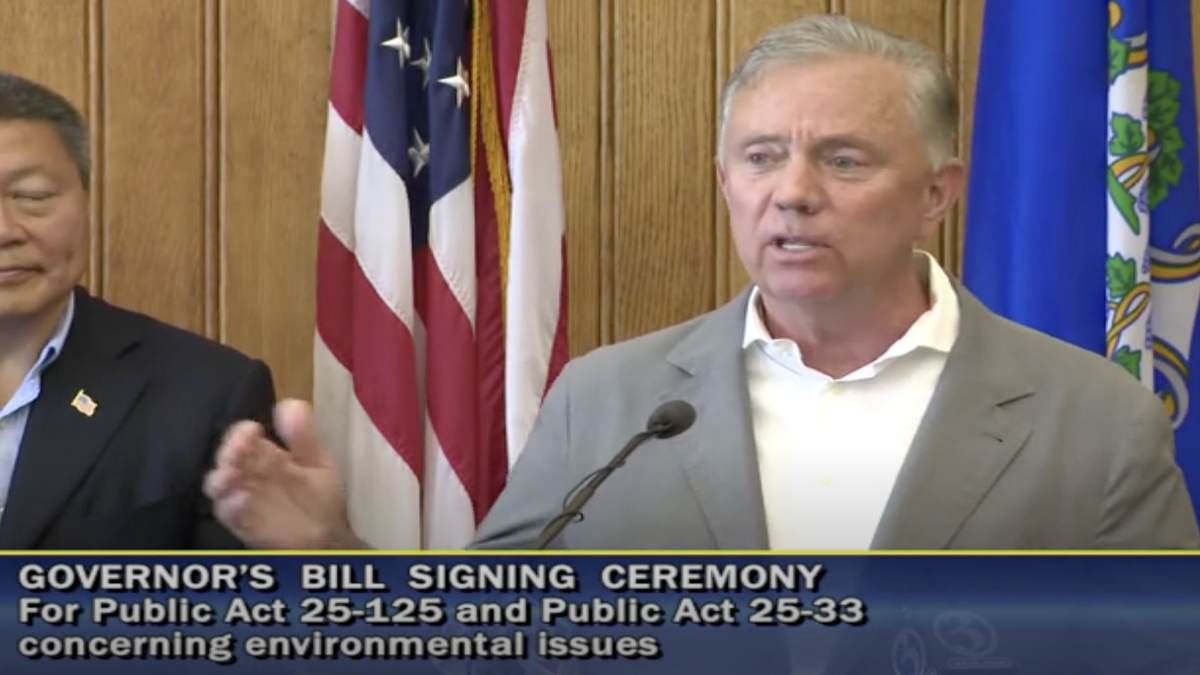On July 1, environmental activists, alongside state officials and lawmakers, praised Gov. Ned Lamont for signing two climate bills, H.B. 5004 and S.B. 9, heralded as groundbreaking legislation. Yet, despite the enthusiasm at the signing ceremony, the laws fall short in delivering meaningful impact.
One proponent, Rep. Aundré Bumgardner (D-Groton) confidently declared that H.B. 5004 “commits Connecticut to net-zero emissions by 2050 with enforceable targets across transportation, buildings and energy.”
Yet this is a misrepresentation. Nowhere in H.B. 5004 does the legislation include enforceable mandates in those sectors. Section 2 of the bill lays out “goals” and permits the Department of Energy and Environmental Protection (DEEP) to adopt regulations. However, these are non-binding — and Connecticut isn’t liable to hit specific carbon benchmarks.
In actuality, H.B. 5004 commits the state to more paperwork: drafting plans, forming advisory councils, and filing annual reports. So, what Rep. Bumgardner calls “targets” are mere aspirations with no consequences for failure.
This was evident during the May 1 House floor debate when Rep. Chris Poulos (D-Southington) asked Rep. John-Michael Parker (D-Madison), the bill’s proponent, “What happens if we don’t meet the greenhouse gas reduction goals?”
Rep. Parker admitted, “There are no specific… ramifications of not meeting these. These are framed here as goals, as targets, to encourage… planning.”
When pressed further, Rep. Parker confirmed that failure to meet the goals would simply lead to reevaluation and adjustments — not enforcement. In other words, the much-hyped “net-zero by 2050” pledge is little more than a green colored climate suggestion box.
Though not to former state representative, Christine Palm, who attended the signing ceremony. A chief climate advocate, Palm praised the bills’ passage, telling reporters it was an “honor” to witness the moment and calling the occasion “a really important” milestone.
Still, she lamented the “painfully” slow pace of public policy on an issue in which “time is a luxury we don’t have” — a reference to what she sees as the rapidly closing window to stop climate catastrophe. Additionally, Palm warned that climate complacency is “foolhardy,” and the issue must be met with “urgency and ferocity.”
Indeed, Palm’s remarks at the signing ceremony contrasted with her prior critiques. During a June 4 interview with the CT Mirror, she gave lawmakers a C+ grade on their climate performance this session.
“We could do a whole lot better, way better, but it’s better than nothing,” she admitted to the news outlet. “There were years when they did nothing… I think what the history is, we do great bills about plants, animals, preservation of land, but addressing climate change, the big umbrella of climate change, very little has been done.”
In the end, Palm was given the ceremonial bill signing pen by Gov. Lamont — and then left it on the table and walked away. (So much for saving the planet. She couldn’t even be bothered to save the pen.)
As for the newly signed laws’ substance, H.B. 5004 sets goals to reach net-zero emissions by 2050. It also establishes a new Clean Economy Council, a “Future of Work” study, and plans to encourage heat pump adoption. Moreover, it orders reports, inventories, and outreach plans, but no mandates.
There are no carbon taxes, no bans on fossil fuel infrastructure, and no required electrification of housing or transportation. If the climate crisis is as dire as these officials claim, this legislation is a bafflingly weak response.
S.B. 9, meanwhile, introduces a few minor climate adaptation measures, including allowing towns to form “resilience improvement districts” and requiring flood risk disclosures in home sales — sensible, perhaps, but hardly revolutionary.
What was signed on July 1 tells a very different story than what was said at the podium. It reflects a broader truth about modern progressive politics where style takes priority over substance. Rep. Bumgardner and Rep. Palm want to be seen as climate warriors. In reality, they passed a bill that reads like an NGO grant proposal — full of buzzwords and action plans, but with nothing that actually compels action.
And don’t expect this to be the end of climate action. With a freshly signed “framework” in hand and plenty of activist applause, lawmakers will be back next session looking to add real teeth — mandates, regulations, and new costs for ratepayers, business, and homeowners. H.B. 5004 may be toothless today, but it’s laying the groundwork for a far more aggressive climate agenda tomorrow. That’s the real plan.

